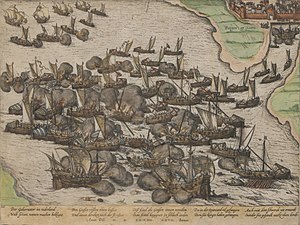
Back Batalla de Reimerswaal Spanish Bataille de Reimerswaal French Battaglia di Reimerswaal Italian აღმოსავლეთ შელდას ბრძოლა (1574) Georgian Slag bij Reimerswaal Dutch Bitwa morska pod Reimerswaal Polish 斯海爾德河海戰 (1574年) Chinese
| Battle of the Scheldt (1574) | |||||||
|---|---|---|---|---|---|---|---|
| Part of the Eighty Years' War | |||||||
 Battle in the Eastern Scheldt between the Spanish and the beggar fleet as portrayed by Frans Hogenberg | |||||||
| |||||||
| Belligerents | |||||||
|
|
| ||||||
| Commanders and leaders | |||||||
|
|
| ||||||
| Strength | |||||||
| 64 ships[4] | 75 ships[5] | ||||||
| Casualties and losses | |||||||
|
300 killed or wounded[6] 2 ships sunk[7] |
15 ships sunk[8] 1,200 dead[4][9] | ||||||
The Battle of the Scheldt also known as the Battle of Walcheren (known in Dutch as Slag bij Reimerswaal) was a naval battle that took place on 29 January 1574 during the Eighty Years' War and the Anglo–Spanish War.[10][11][12] The battle was fought between a Dutch rebel Sea Beggar fleet (which included English and Scottish troops) under Lodewijk van Boisot and a Spanish fleet under Julián Romero.[13] The Spanish fleet was attempting to relieve the Spanish held town of Middelburg which was under siege but the fleet under Boisot intercepted them and were victorious with the destruction or capture of nearly fifteen ships.[14][15][16] Middelburg as a result then surrendered only nine days later along with Arnemuiden.[12][17]
- ^ Watson, Robert (1839). The History of the Reign of Philip the Second, King of Spain. Lyon Public Library: Tegg. p. 251.Quote: The victory was decisive.
- ^ Eggenberger p 487
- ^ Pratt p 162 this led to the surrender of Middelburg
- ^ a b Stevens p 110
- ^ Davies, Charles Maurice (1851). The History of Holland and the Dutch Nation: From the Beginning of the Tenth Century to the End of the Eighteenth. University of California: G. Willis. p. 337.
- ^ Nederlands Historisch Genootschap (1978). Bijdragen en mededelingen betreffende de geschiedenis der Nederlanden, Volume 93 (Dutch). Nijhoff. pp. 460–61.
- ^ Sigmond pp 169-72
- ^ Motley,John Lothrop (1856). The Rise of the Dutch Republic. pp. 527–28.
- ^ Robert (1839) p 251
- ^ Bruce & Cogar pp.47-48
- ^ Rodger p.145
- ^ a b Jaques p.1091
- ^ Knight, Charles Raleigh: Historical records of The Buffs, East Kent Regiment (3rd Foot) formerly designated the Holland Regiment and Prince George of Denmark's Regiment. Vol I. London, Gale & Polden, 1905, p. 11-12
- ^ Nolan p.245
- ^ Fissel p 152
- ^ Wylie, J. A (2015). History of Protestantism in the Netherlands (The History of Protestantism - Book Eighteen ed.). Delmarva Publications, Inc. p. 2509.
- ^ Wegg, Jervis (1924). The Decline of Antwerp Under Philip of Spain. Methuen & Company, Limited. pp. 170–71.